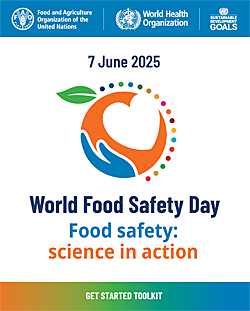 |
|
|
|
Fostering trust, transparency and global collaboration through science in action
World Food Safety Day on 7 June every year draws attention and mobilizes action to prevent, detect and manage foodborne risks and improve human health. Foodborne diseases affect 1 in 10 people worldwide each year. 1,600,000 people get sick due to unsafe food in one day, on average. The theme of World Food Safety Day 2025 is Food safety: science in action. On this World Food Safety Day, we recognize the essential role of science in ensuring food safety and enabling informed decision-making. It helps us understand what makes food unsafe and guides us on how to prevent foodborne diseases. The United Nations General Assembly established World Food Safety Day in 2018 to raise awareness on the importance of food safety. WHO and the Food and Agriculture Organization of the United Nations (FAO) jointly facilitate the observance of World Food Safety Day, in collaboration with Member States and other stakeholders. Everyone can take an active role in preventing foodborne illness, and World Food Safety Day offers an opportunity to get informed and involved. Over the years, WHO and FAO prepared an array of timeless resources on food safety available for your use not only on 7 June, but every day. On 2-4 June 2025, the Nutrition and Food Safety Department of the World Health Organization (WHO) is hosting the WHO Health Talks on Food Safety, to mark the occasion of World Food Safety Day 2025 and explore the theme of this year’s campaign: Food safety: science in action. You can join the Wolrd Health Organisation's webinars andexplore how evidence can translate into impact and understand why science matters at every step of the food safety journey.
2nd June: Advancing food safety through scientific advice: This opening webinar will launch the Health Talks series for World Food Safety Day 2025 by exploring the theme Food safety: Science in action and spotlighting the pivotal role of scientific advice in protecting public health. In today’s interconnected world, where food systems span borders and risks are shared, we must first share reality openly, transparently, and globally. Science enables this. It provides a common language and objective lens through which we can understand hazards, weigh uncertainties, and respond proportionately. Science is the foundation of trust—between institutions and people, between countries and markets. The webinar will showcase how WHO mobilizes scientific expertise through its international advisory bodies to transform cutting-edge research into practical guidance. This guidance informs national food safety policies, supports Codex Alimentarius standards, and safeguards global trade and public health. Only by embracing transparency, independence, and shared scientific understanding can we build and sustain the trust of all stakeholders, governments, industry, academia, civil society, consumers, and communities alike. Trust is not given; it is earned through openness, integrity, and a commitment to science-driven decision-making that serves the public good. Join the World Health Organisation to celebrate the global scientific community and WHO’s leadership in turning science into action for safer food, greater trust, and better health for all. 3rd June: From data to impact: Four imperatives for turning foodborne disease information into action Explore four imperatives for turning information into action to reduce the burden of foodborne diseases. Accurate national estimates of the burden of foodborne disease are critical for shaping effective food safety policies. This webinar will highlight four imperatives that make the case for investing in foodborne disease data: health, economic, environmental, and governance. Drawing from recent work by the WHO Foodborne Disease Burden Epidemiology Reference Group (FERG), speakers will explore how burden estimates can guide risk-based decision-making, strengthen surveillance systems, and support sustainable, science-informed action. The discussion will also spotlight how foodborne disease disproportionately affects young children and vulnerable populations, and how effective policy responses require robust, nationally relevant data. Join global experts to learn how countries can move from data to impact, making food safety a public health priority. 4th June: The WHO Alliance for Food Safety: Advancing science in action To mark World Food Safety Day 2025, the WHO Alliance for Food Safety will host a webinar on this year’s theme: Science in Action. The event will explore how science can be harnessed to strengthen food safety systems, with a focus on the Alliance’s efforts to promote improved foodborne disease surveillance, advocate for stronger laboratory capacity, and support better data generation and use. The webinar will highlight the work of the Alliance’s three technical working groups, which aim to advance integration of foodborne diseases into national surveillance systems, foster collaboration and capacity across laboratories, and improve data sharing and awareness. Through these efforts, the Alliance supports the implementation of the WHO Global Strategy for Food Safety 2022–2030 and encourages countries to invest in systems that are grounded in science and responsive to public health needs. Join us as we bring together global partners to discuss how science can drive progress and how collective action can make food safer for all. Source: Worl Health Organisation |


